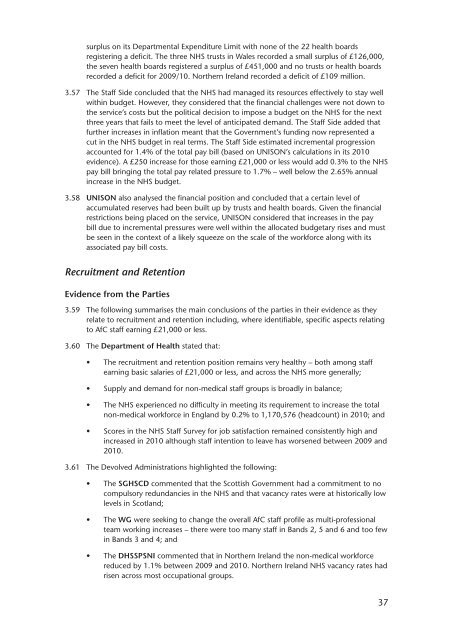NHS pay review body: twenty-sixth report 2012 - Official Documents
NHS pay review body: twenty-sixth report 2012 - Official Documents
NHS pay review body: twenty-sixth report 2012 - Official Documents
You also want an ePaper? Increase the reach of your titles
YUMPU automatically turns print PDFs into web optimized ePapers that Google loves.
surplus on its Departmental Expenditure Limit with none of the 22 health boards<br />
registering a deficit. The three <strong>NHS</strong> trusts in Wales recorded a small surplus of £126,000,<br />
the seven health boards registered a surplus of £451,000 and no trusts or health boards<br />
recorded a deficit for 2009/10. Northern Ireland recorded a deficit of £109 million.<br />
3.57 The Staff Side concluded that the <strong>NHS</strong> had managed its resources effectively to stay well<br />
within budget. However, they considered that the financial challenges were not down to<br />
the service’s costs but the political decision to impose a budget on the <strong>NHS</strong> for the next<br />
three years that fails to meet the level of anticipated demand. The Staff Side added that<br />
further increases in inflation meant that the Government’s funding now represented a<br />
cut in the <strong>NHS</strong> budget in real terms. The Staff Side estimated incremental progression<br />
accounted for 1.4% of the total <strong>pay</strong> bill (based on UNISON’s calculations in its 2010<br />
evidence). A £250 increase for those earning £21,000 or less would add 0.3% to the <strong>NHS</strong><br />
<strong>pay</strong> bill bringing the total <strong>pay</strong> related pressure to 1.7% – well below the 2.65% annual<br />
increase in the <strong>NHS</strong> budget.<br />
3.58 UNISON also analysed the financial position and concluded that a certain level of<br />
accumulated reserves had been built up by trusts and health boards. Given the financial<br />
restrictions being placed on the service, UNISON considered that increases in the <strong>pay</strong><br />
bill due to incremental pressures were well within the allocated budgetary rises and must<br />
be seen in the context of a likely squeeze on the scale of the workforce along with its<br />
associated <strong>pay</strong> bill costs.<br />
Recruitment and Retention<br />
Evidence from the Parties<br />
3.59 The following summarises the main conclusions of the parties in their evidence as they<br />
relate to recruitment and retention including, where identifiable, specific aspects relating<br />
to AfC staff earning £21,000 or less.<br />
3.60 The Department of Health stated that:<br />
3.61<br />
•<br />
•<br />
•<br />
•<br />
The recruitment and retention position remains very healthy – both among staff<br />
earning basic salaries of £21,000 or less, and across the <strong>NHS</strong> more generally;<br />
Supply and demand for non-medical staff groups is broadly in balance;<br />
The <strong>NHS</strong> experienced no difficulty in meeting its requirement to increase the total<br />
non-medical workforce in England by 0.2% to 1,170,576 (headcount) in 2010; and<br />
Scores in the <strong>NHS</strong> Staff Survey for job satisfaction remained consistently high and<br />
increased in 2010 although staff intention to leave has worsened between 2009 and<br />
2010.<br />
The Devolved Administrations highlighted the following:<br />
• The SGHSCD commented that the Scottish Government had a commitment to no<br />
compulsory redundancies in the <strong>NHS</strong> and that vacancy rates were at historically low<br />
levels in Scotland;<br />
• The WG were seeking to change the overall AfC staff profile as multi-professional<br />
team working increases – there were too many staff in Bands 2, 5 and 6 and too few<br />
in Bands 3 and 4; and<br />
The<br />
• DHSSPSNI commented that in Northern Ireland the non-medical workforce<br />
reduced by 1.1% between 2009 and 2010. Northern Ireland <strong>NHS</strong> vacancy rates had<br />
risen across most occupational groups.<br />
37
















